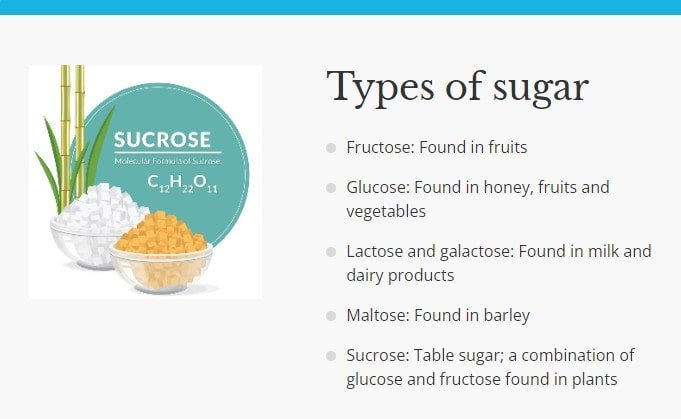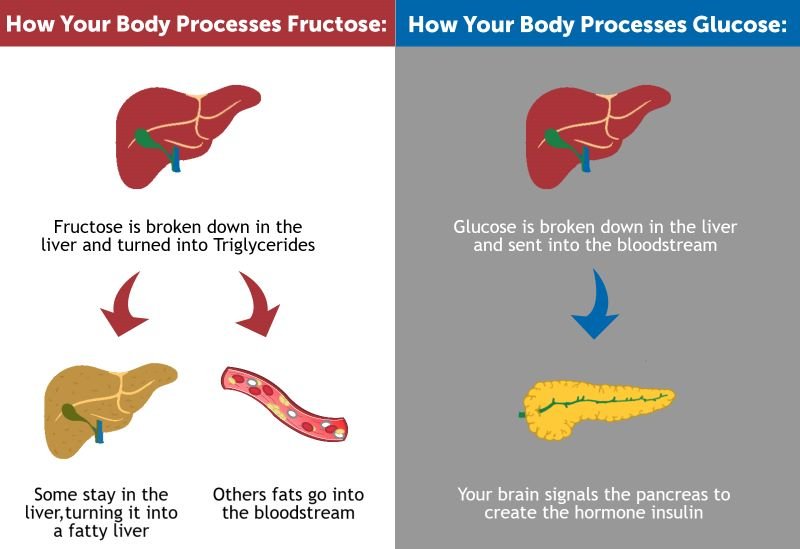If You Stop Eating Sugar Will You Lose Weight? Yes, Here’s Why

Are you wondering if giving up sugar can help you lose weight? You’re not the only one thinking about cutting sugar out of their diet.
To keep you from the agony, the short answer is that YES, if you stop eating sugar you will lose weight.
But, it’s important to know how sugar can affect your body and contribute to weight gain. Let’s look at the facts and understand how sugar can impact your health.
Ready to find out more? I’ll clear up some common misunderstandings and reveal the facts about what happens to your body when you reduce sugar intake.
IMPORTANT: Throughout this article you will find links to research studies and other trusted medical sources. If in doubt for any of the information on this page, I urge you to follow these links (all links open in a new window) to fact check my writings. If you need a citation on something found on this article, contact me here.
What is sugar?
I believe, the first thing you need to know to understand why sugar makes you fat, you need to understand, what is sugar in the first place.
In simple terms, s. sugar is a sweet substance mostly obtained from plants like sugarcane and sugar beets. [1]
Sugar can be found in many fruits and vegetables as well
However, the sugar that we usually consume is refined and processed, which means that it has been stripped of its natural nutrients and fiber. [2]
This makes it easier to digest and absorb, but also more likely to cause problems in our bodies.

When you eat sugar, your body turns it into glucose, which is used for energy.
However, if you eat more sugar than your body needs, it stored as excess fat because your body turns any sugar it doesn’t use right away into fat.

Now, it’s not just about gaining weight; too much sugar can also disrupt how your body works and can affect hormones.
What’s more, eating a lot of sugar can increase your risk of serious illnesses such as type 2 diabetes and heart disease.
What Happens To Your Body When You Eat Sugar?
When you eat sugar, your body reacts in ways that can affect your health.
- Quick Energy Burst: Sugar enters your bloodstream fast, which makes your blood sugar level go up quickly. This can make you feel more energetic for a little while, but the energy doesn’t last long.
- Insulin Goes to Work: To manage the increased blood sugar, your pancreas produces insulin. Insulin’s job is to help sugar move from your blood into your cells, where it’s used for energy.
- Could Lead to Weight Gain: If you eat more sugar than your body needs for energy, it stores the extra as fat. This can lead to gaining weight over time.
- Feeling Tired and Hungry: Once insulin has done its work, your blood sugar level can fall. This drop might make you feel tired and could cause you to feel hungry again, which might lead to eating more than you need.
When Your Body Turns Sugar Into Fat?
If you eat more sugar than your body uses for energy, it saves this sugar as fat for the future.
This is called lipogenesis, and it’s a big reason for gaining weight. Keeping your blood sugar levels under control is crucial to stop this from happening.
When your blood sugar is high, your body puts out insulin to manage it. But insulin also tells your body to store fat. [3]
This means eating a lot of sugar can make you put on weight. If you cut down on sugar, you can better control your blood sugar, store less fat, and maybe even lose weight.
TIP: Instead of snacking on candy, you could try eating fruit when you want something sweet. Fruit has natural sugars that are better for you. Also, reading food labels to see how much added sugar is in your food can help you make better choices. Remember, small changes in your diet can make a big difference in how you feel and look.
Other ways sugar harms your health
Eating too much sugar can harm your health in several ways beyond just making you gain weight. Here are some of the hidden dangers of sugar that you might not be aware of:
- Sugar can damage your teeth. When you eat sugary foods, bacteria in your mouth feed on the sugar and produce acids that erode your enamel, the protective layer of your teeth. This can lead to cavities, tooth decay, and gum disease. [4]
- Sugar can increase your risk of diabetes. When you consume sugar, your body releases insulin, a hormone that helps regulate your blood sugar levels. However, if you eat too much sugar, your body can become resistant to insulin, meaning that it doesn’t work as well as it should. This can cause your blood sugar levels to rise and eventually lead to type 2 diabetes, a chronic condition that affects your metabolism and can cause serious complications. [5]
- Sugar can affect your mood and mental health. Sugar can give you a temporary boost of energy and happiness, but it can also cause you to crash and feel tired, irritable, and depressed. Studies have shown that high sugar intake is associated with an increased risk of depression, anxiety, and cognitive impairment. [6]
- Sugar can interfere with your sleep quality. Sugar can also interfere with your sleep quality, by stimulating your brain and leading to insomnia. [7]
- Sugar can weaken your immune system. Sugar can impair the function of your white blood cells, which are responsible for fighting off infections and diseases. This can make you more susceptible to getting sick and having a harder time recovering. [8]
- Sugar can also cause inflammation in your body. Inflammation is know to contribute to chronic conditions such as heart disease, cancer, and arthritis. [9] [10]
By reducing the sugar you eat, you’re not just working on losing weight, but you’re also protecting your body from these health problems.
What the science says?
Research shows that cutting down on sugar can help you lose weight.
For example, a study on 192 non-dieting women aged 20–30 investigated if saying they restrict sugar actually matches their real sugar intake and diet quality. [11]
The group that claimed to restrict sugar (RS) had 22% less daily sucrose (sugar) intake than the non-restricting group (nRS).
RS group also had better diet quality, with higher nutrient content (7–38%) and lower sucrose (22%). Both groups ate more on weekends, but restricting sugar group maintained better nutrient balance.
The study It suggests that intending to cut sugar improves overall diet by reducing sugar and increasing nutrients, but maintaining a healthy weekend diet is still a challenge.
In a systematic review published by researchers in New Zealand looked at 71 studies on sugar and body weight. [12]
They found that cutting down [only] on sugars, as recommended by global guidelines, led to a small but average weight loss of 0.8 kg.
The study focused on “free sugars” added to food and naturally present in honey, syrups, and fruit juices.
Reducing sugar intake in adults showed the weight loss effect, but it was less consistent in children. The research suggests that advising people to cut sugar could be a helpful part of strategies to fight obesity, although the impact might vary over time and among individuals.
Furthermore, a review article on obesity and sugar consumption in the US highlights that despite a decrease in sugar intake, the country still exceeds recommended daily sugar limits. [13]
Two-thirds of the population in the US is overweight or obese, leading to significant healthcare costs. While low-fat diets were once thought to be the solution, obesity rates continue to rise.
I wonder why?
So, how much sugar can you eat?
When figuring out how much sugar to eat, it’s important to stay within healthy limits to avoid harming your body and feeling tired.
Here’s a simple guide to how much sugar you can have:
- Men should have no more than 9 teaspoons (37.5 grams) of extra sugar a day, and women should have no more than 6 teaspoons (25 grams), according to the American Heart Association. [14]
- The World Health Organization advises that adults and kids should get less than 10% of their energy from added sugars every day. [15]
- Eat plenty of fruits, veggies, and whole grains because they’re full of nutrients.
- Try not to eat too many processed foods; they often have a lot of hidden sugar.
On the other hand UK’s NHS recommends the following: [16]
- Adults should have no more than 30g of free sugars a day, (roughly equivalent to 7 sugar cubes).
- Children aged 7 to 10 should have no more than 24g of free sugars a day (6 sugar cubes).
- Children aged 4 to 6 should have no more than 19g of free sugars a day (5 sugar cubes).
- There’s no guideline limit for children under the age of 4, but it’s recommended they avoid sugar-sweetened drinks and food with sugar added to it.
Frequently Asked Questions
Final Take
If you cut back on sugar, you are likely to drop some pounds. Here’s the reason: when you consume too much sugar, your body transforms it into fat. This can cause you to gain weight. Not only does reducing sugar intake help you slim down, but it’s also good for your health in general.
Research confirms that eating less sugar can lead to weight loss. It’s fine to treat yourself to a bit of sugar occasionally, but it’s crucial to limit your intake. By eating less sugar, you’ll notice your waistline shrinking and you’ll feel healthier.
By reducing sugar in your diet, you’ll benefit from a healthier body. For example, instead of snacking on candy, try a piece of fruit or a handful of nuts. These snacks are not only lower in sugar but also provide nutrients your body needs.
More On Weight Loss
